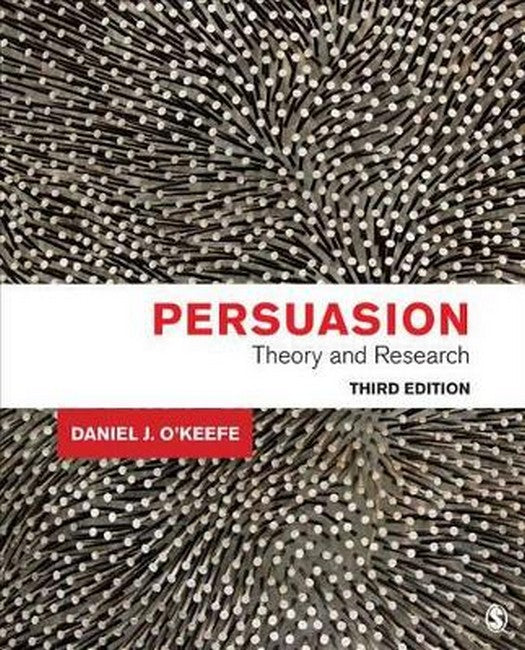Daniel J. O'Keefe is the Owen L. Coon Professor in the Department of Communication Studies at Northwestern University. He received his Ph.D. from the University of Illinois at Urbana-Champaign and has been a faculty member at the University of Michigan, Pennsylvania State University, and the University of Illinois. He has received the National Communication Association's Charles Woolbert Research Award, its Golden Anniversary Monograph Award, its Rhetorical and Communication Theory Division Distinguished Scholar Award, and its Health Communication Division Article of the Year Award, the International Communication Association's Best Article Award and its Division 1 John E. Hunter Meta-Analysis Award, the International Society for the Study of Argumentation's Distinguished Research Award, the American Forensic Association's Daniel Rohrer Memorial Research Award, and teaching awards from Northwestern University, the University of Illinois, and the Central States Communication Association.
Request Academic Copy
Please copy the ISBN for submitting review copy form
Description
Preface Chapter 1: Persuasion, Attitudes, and Actions The Concept of Persuasion The Concept of Attitude Attitude Measurement Techniques Attitudes and Behaviors Assessing Persuasive Effects Conclusion Notes Chapter 2: Social Judgment Theory Judgments of Alternative Positions on an Issue Reactions to Communications Critical Assessment Conclusion Notes Chapter 3: Functional Approaches to Attitude A Classic Functional Analysis Subsequent Developments Commentary Conclusion Notes Chapter 4: Belief-Based Models of Attitude Summative Model of Attitude Research Evidence and Commentary Conclusion Notes Chapter 5: Cognitive Dissonance Theory General Theoretical Sketch Some Research Applications Revisions of, And Alternatives to, Dissonance Theory Conclusion Notes Chapter 6: Reasoned Action Theory The Reasoned Action Theory Model Influencing Intentions Intentions and Behaviors Adapting Persuasive Messages to Recipients Based on Reasoned Action Theory Commentary Conclusion Notes Chapter 7: Stage Models The Transtheoretical Model The Distinctive Claims of Stage Models Other Stage Models Conclusion Notes Chapter 8: Elaboration Likelihood Model Variations in the Degree of Elaboration: Central versus Peripheral Routes to Persuasion Factors Affecting the Degree of Elaboration Influences on Persuasive Effects under Conditions of High Elaboration: Central Routes to Persuasion Influences on Persuasive Effects under Conditions of Low Elaboration: Peripheral Routes to Persuasion Multiple Roles for Persuasion Variables Adapting Persuasive Messages to Recipients Based on the ELM Commentary Conclusion Notes Chapter 9: The Study of Persuasive Effects Experimental Design and Causal Inference Two General Challenges in Studying Persuasive Effects Conclusion Notes Chapter 10: Communicator Factors Communicator Credibility Liking Other Communicator Factors Conclusion Notes Chapter 11: Message Factors Message Structure and Format Message Content Sequential Request Strategies Conclusion Notes Chapter 12: Receiver Factors Individual Differences Transient Receiver States Influencing Susceptibility to Persuasion Conclusion Notes References Author Index Subject Index About the Author

